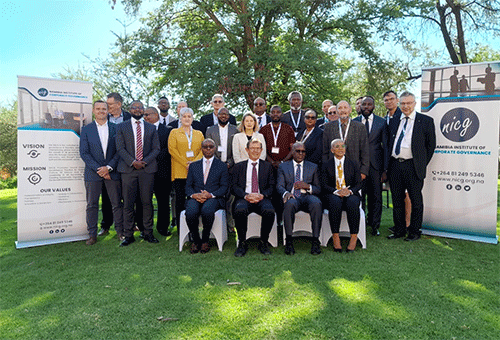Namibians will decide if recent oil discoveries will positively change their lives or become another curse.
Responding to what the impact of oil discovery and ambitions of green hydrogen on the socio-economic landscape will be, mines minister Tom Alweendo said the impact will be what Namibians decide it to be.
“We are aware of countries where the discovery of oil became a curse rather than a blessing. But there are also countries where oil discovery became a blessing. I believe we all want the discovery of oil and green hydrogen to be a blessing rather than a curse as we see the potential they could have for our country,” said Alweendo yesterday during the national corporate governance conference and annual general meeting of the Namibia Institute of Corporate Governance (NICG).
The two-day conference kicked off in Windhoek, and it was hosted under the theme, ‘Mind shift – Real Contextualised Sustainability for Namibia (Contextualising SDGs, ESGs, HPPs, NDPs, NDCs)’.
The event brought together government, parastatals, business sector leaders and regulatory institutions for an exchange of insights, intelligence and ideas that will drive governance excellence in the coming years.
However, Alweendo said the Namibian policy environment, especially the institutional and political aspects, will ultimately determine whether there will be a resource curse or blessing.
“It has been proven that countries with strong institutions, a stable political system and an effective legal framework were able to manage their revenue with a positive impact on the economy and for the benefit of their citizens. Our institutions, political systems and legal framework are well placed,” stressed the mines minister.
However, Alweendo noted government should be mindful to manage these resources, with a clear understanding that resources and the benefits derived from them belong to both the current and future generations.
He further stated Namibia will not be producing oil tomorrow but only after some years, giving the country enough time to prepare itself to make sure that when that happens, Namibia can make use of the opportunities presented to it most beneficially.
“For those of us involved in the policy-making process in the extractive industry, we must ensure this policy addresses the two most topical community issues, namely the licence to operate and sustainability. In its broadest definition, a licence to operate is beyond meeting the regulatory approvals and the point of obtaining a provisional licence or mining licence,” he explained.
Licence to operate is also about presenting a manifesto that outlines a company’s commitment to social improvement.
This includes aspects like providing decent jobs and training to local employees, respecting local cultures and customs and minimising the environmental impact and contributing to the broader advancement of affected communities in which businesses operate, added Alweendo.
NICG chairperson Steve Galloway said there is still much room for growth and improvement for Namibia in terms of corporate governance to ensure that every single Namibian citizen benefits from the ethical and effective leadership of organisations – both public and private.
At the same occasion, finance minister Ipumbu Shiimi said corporate governance is a hallmark of sustainability and economic development.
“You can’t achieve results unless your governance is very effective. Governance revolves around processes, systems and institutions,” noted Shiimi.
– mndjavera@nepc.com.na


